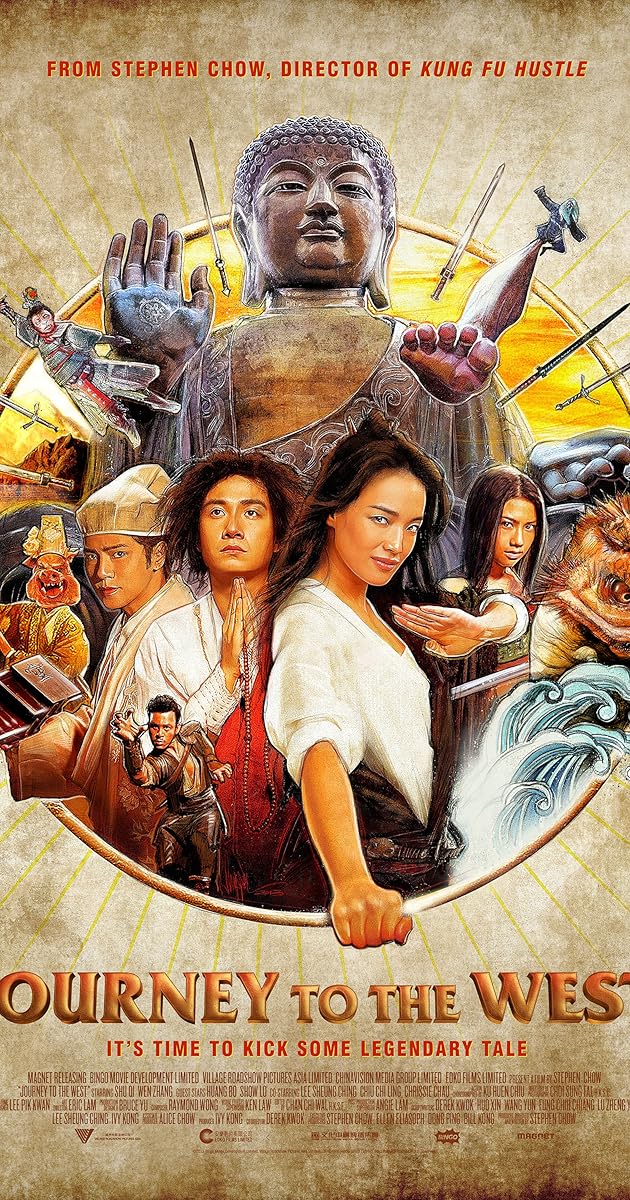 Journey to the West (2013)
Journey to the West (2013)
Journey to the West (Chinese: 西遊記; pinyin: Xī Yóu Jì) is a Chinese novel published in the 16th century during the Ming dynasty and attributed to Wu Cheng'en. It is one of the Four Great Classical Novels of Chinese literature. It has been described as arguably the most popular literary work in East Asia. Arthur Waley's abridged translation, Monkey, is known in English-speaking countries.
The novel is an extended account of the legendary pilgrimage of the Tang dynasty Buddhist monk Xuanzang, who travelled to the "Western Regions" (Central Asia and the Indian subcontinent) to obtain Buddhist sacred texts (sūtras) and returned after many trials and much suffering. The monk is referred to as Tang Sanzang in the novel. The novel retains the broad outline of Xuanzang's own account, Great Tang Records on the Western Regions, but adds elements from folk tales and the author's invention: Gautama Buddha gives this task to the monk and provides him with three protectors who agree to help him as an atonement for their sins. These disciples are Sun Wukong, Zhu Bajie and Sha Wujing, together with a dragon prince who acts as Tang Sanzang's steed, a white horse. The group of pilgrims journeys towards enlightenment by the power and virtue of cooperation.
Journey to the West has strong roots in Chinese folk religion, Chinese mythology, Confucianist, Taoist and Buddhist philosophy, and the pantheon of Taoist immortals and Buddhist bodhisattvas are still reflective of some Chinese religious attitudes today. Enduringly popular, the novel is at once a comic adventure story, a humorous satire of Chinese bureaucracy, a source of spiritual insight, and an extended allegory.
The earliest known full-length version of Journey to the West was published anonymously in 1592, preceded by two briefer versions. The question of authorship is further complicated by the fact that a good deal of the novel's material had been published in the form of folk tales. Anthony C. Yu, writing in 2012, warned that "this vexing dispute over the novel's authorship, similar to that on the priority of its textual versions, see-sawed back and forth for nearly a century without resolution."
Hu Shih, literary scholar and former Ambassador to the United States, wrote that the novel was thought to have been written and published anonymously by Wu Cheng'en. He reasoned that the people of Wu's hometown attributed it early on to Wu, and kept records to that effect as early as 1625; thus, claimed Ambassador Hu, Journey to the West was one of the earliest Chinese novels for which the authorship is officially documented.
Recent scholarship casts doubts on this attribution. Brown University Chinese literature scholar David Lattimore states: "The Ambassador's confidence was quite unjustified. What the gazetteer says is that Wu wrote something called The Journey to the West. It mentions nothing about a novel. The work in question could have been any version of our story, or something else entirely." Translator W. J. F. Jenner points out that although Wu had knowledge of Chinese bureaucracy and politics, the novel itself does not include any political details that "a fairly well-read commoner could not have known."
Regardless of the origins and authorship, Journey to the West has become the authoritative version of these folk stories, and Wu's name has become inextricably linked with the book.
How to download ? Check the video below !!!!
DOWNLOAD | LANGUAGE | QUALITY | SIZE |
| Hindi/Chinese- ESub | 720pMKV | 900MB | |
| Hindi/Chinese-Esub | 480pMKV | 370MB |







0 Comments